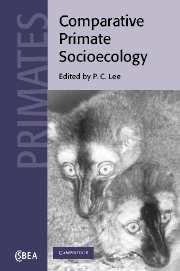Part 1 - Comparative methods
Published online by Cambridge University Press: 24 August 2009
Summary
Editor's introduction
Our ability to analyse variation within and between taxonomic groups has been enhanced by the development of techniques for the statistical manipulation of comparative data, but we have yet to reach a consensus on which techniques are appropriate for specific analyses. Thus, several possible approaches are presented. A comprehensive overview of the pros and cons, as well as how to carry out different comparative techniques can be found in Harvey and Pagel (1991).
It should be noted that there are two separate issues involved in phylogenetic analyses. The first of these is fundamentally statistical. Although it has long been recognised that the use of ‘species’ data in comparative analyses on closely related taxa may violate statistical assumptions of independence of data points (e.g. Crook, 1965), this was elaborated in relation to phylogenetic similarity in allometry by Felsenstein (1985). Stated simply, closely related taxa may share traits derived through that genealogical relationship rather than as a result of selection, and species as such are not independent within lineages. This issue had been at least partially explored in earlier socioecological and life history research on primates through data reduction techniques – the use of mean values for different taxonomic levels – the ‘higher node’ approach (e.g. genera: Clutton-Brock and Harvey, 1977; subfamily: Harvey, Martin and Clutton- Brock, 1987).
But there is a second, more interesting, question raised by comparative analyses, that of the evolutionary similarity within and between related taxa (Purvis and Harvey, 1995), and it is in this context that the value of phylogenetically controlled comparisons is most apparent.
- Type
- Chapter
- Information
- Comparative Primate Socioecology , pp. 1 - 4Publisher: Cambridge University PressPrint publication year: 1999



